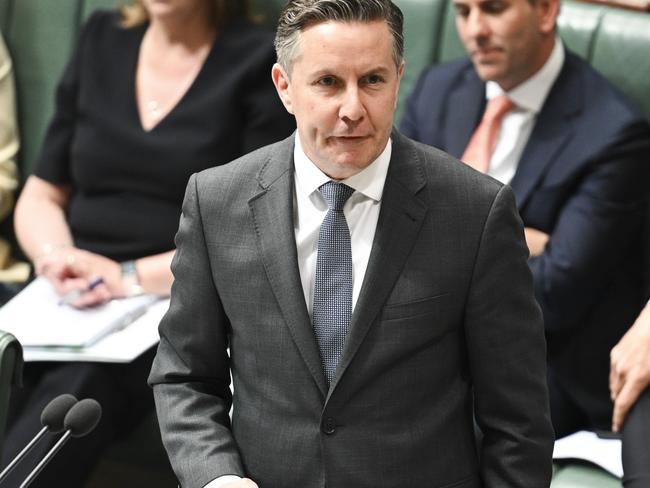A lobby group is trying to stop chemists making compounds of weight-loss Ozempic-style drugs
An emotional multi-billion dollar battle is being fought over who gets access to the revolutionary weight loss drug and the availability of ‘chemists own’ versions in Australia
NSW
Don't miss out on the headlines from NSW. Followed categories will be added to My News.
It may be the “It” drug revolutionising the weight loss industry but it is also at the centre of a multi-billion dollar pharmaceutical war.
On one side of the Ozempic debate are the original beneficiaries, the people who suffer from diabetes and struggling to get access to the drug that is helping to manage blood glucose levels, and on the other side are people with obesity issues, hungry for the drug for its weight-loss qualities.
And now we have a new adversary – the eating disorder alliance trying to block chemist-own versions of the “miracle” drug because of fears around copycat versions getting in the hands of those most vulnerable to anorexia, bulimia and other eating disorders.
The battle is so fierce that an army of people struggling with obesity are uniting to tell the Federal Government that banning compounded GLP-1 medications – compound versions of Ozempic – which is in drastic short supply, will have a devastating impact on their quest to get healthy.
And quite simply it doesn’t make sense, says Elyse Wilkinson, one of at least 100 Australians who have written to Federal Health minister Mark Butler.

“The government is flying from the hip as far as I am concerned, there are a minority of people up in arms about this and a lot of misinformation,” the Newcastle woman told the Saturday Telegraph.
“Personally I think Hollywood has a lot to do with it. This ‘Oh look I have a tiny waist’ and allowing the assumptions that it’s all because of Ozempic. I am here to say you can have a tiny waist too if you’re on the treadmill every day.
“It’s not just the medication, I put a lot of work into my complete 180. It’s exercise and the drug is one piece of the puzzle. It’s very good in reducing the food noise so I can concentrate on what I need to eat and not what I am craving.”
Ms Wilkinson stopped taking the compound medicine about a month ago after losing 28kg and achieving her desired weight.
She is writing to the Minister and is vocal about her experience with weight loss drugs to remove the stigma about doing it “the wrong way”.
“I was trying to do what I thought was the correct way and it wasn’t working.”
Kerrie Shepphard is a paramedic who lives in Health Minister Mark Butler’s electorate with her husband and children. She’s lost 7kg so far.
Having struggled with her weight for 25 years, she tried “absolutely everything to get her weight under control”, but when she climbed over 100kg and began experiencing heart palpitations, her cardiologist said weight loss was critical.

With high cholesterol, pre-diabetes and menopausal symptoms affecting her health, she knew something needed to change.
When Ozempic and Mounjaro became unavailable due to shortages, she joined the Eucalyptus telehealth program called Juniper and was prescribed Mounjaro and then a compounded alternative, but now she is frustrated at the potential TGA ban and what it will mean for her progress.
Ms Shellhard has also written to Mr Butler urging him to not restrict the drugs that are “changing lives”.
But the Eating Disorders Alliance (EDA), an alliance of major eating disorder organisations in Australia and New Zealand, said they were also writing to Mr Butler to seek the removal of weight loss drugs manufacture in compounding pharmacies to protect the vulnerable.
The EDA has raised several concerns with the TGA regarding the use of weight loss medications, particularly relating to pharmaceutical compounding, but also around the lack of comprehensive medical assessments required to access these versions of GLP-1 RAs medication, particularly in telehealth consultations.
The EDA also raised significant concerns about young people using medically unapproved weight-loss products and the influence of social media on targeted marketing of these medications to this vulnerable demographic.

There are currently 1.1 million Australians living with an eating disorder with women and girls twice as likely than other genders to be affected.
With these weight loss drugs aimed mainly at women, the lack of consultation and appropriate regulation around the use and distribution of these medications could have particularly disastrous consequences, the EDA claims.
Doctors at Eucalyptus – who offer treatments that include Ozempic and now compound medications from two “highly sophisticated compounding pharmacies” – disagree.
Dr Matt Vickers, Clinical Director at Eucalyptus, said that “as with all consultations relating to weight management, we undertake extensive screening assessments for disordered eating behaviours. Compounding does not change the process or the risk in any way.”
Despite the noise, Australians will no doubt continue sourcing versions of Ozempic, considering the drug is now next to impossible to source.
As well as the high demand for the drug, the cold hard fact is the customers in the US are prepared to pay more for their supply.

American citizens are reportedly paying between $1300 and $2000 per week for the drug, compared to $130 for a monthly script in Australia or more for Telehealth subscriptions with companies such as Juniper that also offer regular counselling, dietary advice, doctors consultations and other services with the prescription.
Australian customers are meanwhile on tenterhooks, waiting for news on whether or not the TGA will cut off their supply to the compound drugs.
This week Ozempic manufacturer Novo Nordisk Pharmaceuticals gave some insight on the status of play in Australia and globally.
Speaking at the Inquiry into Diabetes in Australia this week, Cem Ozenec, the Corporate Vice-president and General Manager, Oceania, said: “Novo Nordisk should have expected such a demand maybe five or six years ago, before we launched these products.
“None of us forecast that; we didn’t have a crystal ball.
“The treatments being this effective and, of course, raising awareness around obesity, created this unprecedented demand.
“What Novo Nordisk are committed to and what we are doing every day is building manufacturing sites like there’s no tomorrow. We invested close to US$10 billion only last year, and we have bought another global manufacturing site, which is another US$10 billion.
“But, as you can imagine, the manufacturing process is complex and it will take time. I think this issue points towards unmet needs. It also points towards the burden, in that there were no real effective treatments and these are the first line of them.
“It also tells us that there is a huge problem and these treatments, and more of them, will be needed in the future. We are very committed to continuing to do that, through increasing our manufacturing capacity.”
In 2023, Novo Nordisk doubled the volume of supply coming to Australia.
“At the same time, I can tell you that, together with the TGA, we advise not starting new patients with type 2 diabetes and other indications on them, as we have a limited supply,” Mr Ozenec said.
“Even though we doubled it, this is going to be the case until the end of 2024. For the foreseeable future, we continue to expect that there will be an imbalance in that demand and supply.”
Got a news tip? Email weekendtele@news.com.au





